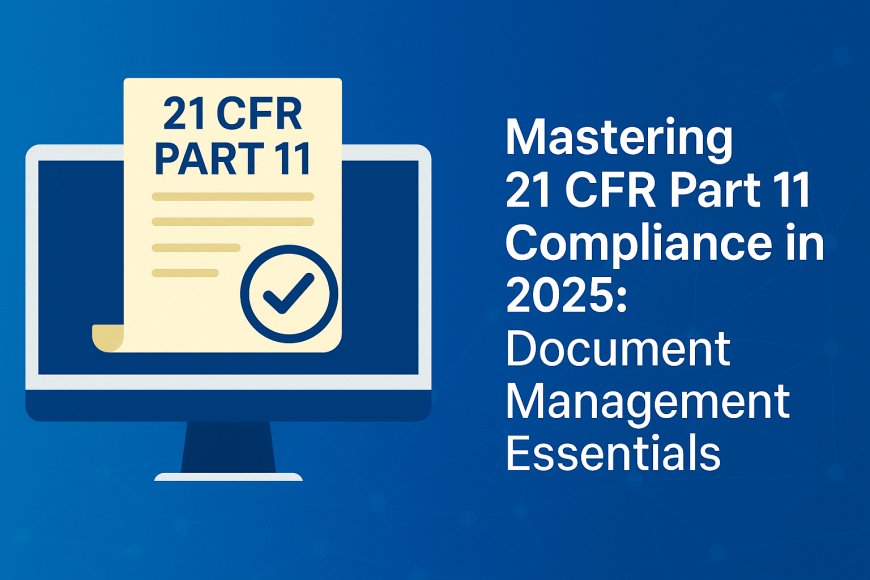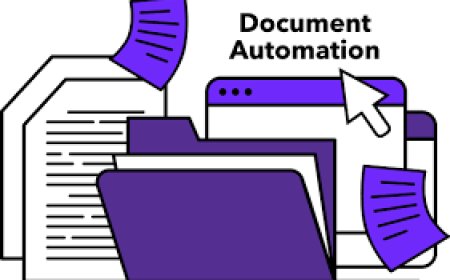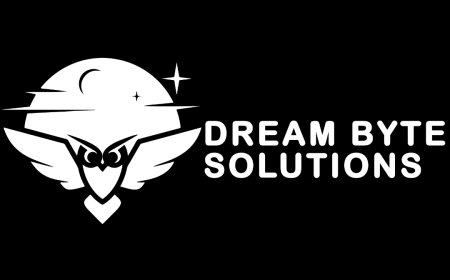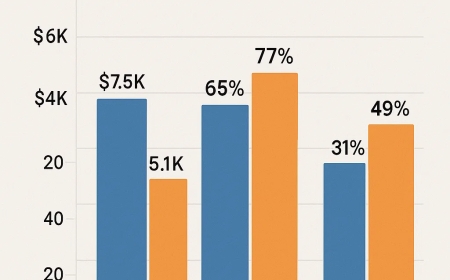Mastering 21 CFR Part 11 Compliance in 2025: Document Management Essentials
Explore how mastering 21 CFR Part 11 compliance is critical for life sciences companies. Learn about document management software for medical devices, pharmaceuticals, and biologics, and how modern solutions can streamline compliance and operational efficiency in 2025

In the highly regulated world of life sciences, ensuring compliance with 21 CFR Part 11 is a vital part of business operations. This regulation, established by the U.S. Food and Drug Administration (FDA), governs the use of electronic records and electronic signatures, ensuring they are trustworthy, secure, and valid. As industries such as medical devices, pharmaceuticals, and biologics continue to evolve, mastering 21 CFR Part 11 compliance in 2025 becomes increasingly important. For companies within these sectors, an effective document management system is essential in meeting regulatory requirements while maintaining operational efficiency.
In this blog, we will explore the essentials of mastering 21 CFR Part 11 compliance in 2025, with a focus on the critical role of document management software for medical devices, the pharmaceutical industry, and biologics. We will also discuss the impact of regulatory changes and how modern document management systems can help companies stay compliant.
Understanding 21 CFR Part 11 Compliance
21 CFR Part 11 is a section of the Code of Federal Regulations issued by the FDA that outlines the criteria for electronic records and electronic signatures in regulated industries. The primary aim of this regulation is to ensure that electronic records are as trustworthy and reliable as their paper counterparts, making them legally acceptable for regulatory submissions and audits.
Key Elements of 21 CFR Part 11
The regulation sets forth the requirements for validating electronic records and signatures, as well as ensuring that data integrity is maintained throughout the lifecycle of the record. The key components include:
- Audit Trails: The ability to track changes made to electronic records, ensuring the history of modifications is transparent.
- Security Controls: Ensuring access to sensitive data is restricted and only authorized individuals can make modifications.
- Electronic Signatures: Ensuring that electronic signatures are legally binding and securely linked to the respective records.
These provisions are designed to ensure data integrity, authenticity, and accountability, making them critical for life sciences companies, including those in the medical device, pharmaceutical, and biologics industries.
Document Management Software for Medical Devices
In the medical device industry, compliance with 21 CFR Part 11 is paramount. Medical device manufacturers must manage extensive documentation throughout the product lifecycle, from design and development to manufacturing and post-market surveillance. Effective document management software for medical devices plays a central role in ensuring compliance with this regulation.
Key Considerations for Medical Device Document Management
Medical device companies are subject to rigorous regulatory oversight, and their documentation must meet the high standards set by the FDA, including those outlined in 21 CFR Part 11. The use of document management software helps companies automate workflows, secure records, and ensure that all changes to documents are tracked and documented.
Key capabilities that document management software for medical devices should offer include:
- Audit Trails: The software must automatically generate a detailed, tamper-proof record of all changes made to documents. This ensures that the integrity of the documentation is maintained and supports regulatory audits.
- Version Control: Medical device companies often work with multiple versions of a document. A robust document management system ensures that the most current version is always available, while previous versions are securely archived.
- Security and Access Control: Sensitive information must be protected. Document management software ensures that only authorized personnel can access, modify, or approve documents, reducing the risk of unauthorized changes.
Document Management System for Pharmaceutical Industry
The pharmaceutical industry is one of the most heavily regulated sectors in the world. Compliance with 21 CFR Part 11 is essential for pharmaceutical companies to ensure that electronic records are valid and reliable. A document management system for the pharmaceutical industry must be capable of handling a variety of documentation types, including batch records, test results, and regulatory filings.
Streamlining Compliance with a Document Management System
In the pharmaceutical industry, maintaining compliance with 21 CFR Part 11 is challenging due to the volume and complexity of the required documentation. A comprehensive document management system automates key processes, reduces manual errors, and ensures that all documents meet regulatory standards.
Important features for a pharmaceutical document management system include:
- Automated Document Control: Pharmaceutical companies often deal with large volumes of documents that need to be managed and stored. Automation ensures that all documents are created, reviewed, and approved according to the relevant procedures, with minimal human intervention.
- Regulatory Compliance Tracking: A document management system helps pharmaceutical companies track compliance with various regulatory requirements, including 21 CFR Part 11, ensuring that they are audit-ready at all times.
- Secure Storage and Access: Ensuring that sensitive data is securely stored and that access is granted only to authorized personnel is a critical requirement for the pharmaceutical industry.
Biotech Change Management Software: A Critical Component for Compliance
The biotechnology industry faces unique challenges when it comes to managing change control, particularly as it deals with complex biological products. Biotech companies must adhere to strict regulations, including 21 CFR Part 11, while managing complex documentation related to research, development, and manufacturing.
The Role of Biotechnology Change Management Software
Biotechnology change management software is essential for ensuring that changes in processes, materials, and documentation are thoroughly reviewed and compliant with 21 CFR Part 11. These software solutions automate the change control process, streamline approvals, and ensure that all changes are well-documented and compliant with regulatory standards.
Key features of biotech change management software include:
- Real-Time Collaboration: Biotech companies often involve multiple departments in change control processes, including R&D, manufacturing, and regulatory affairs. A centralized software solution ensures that all stakeholders can collaborate seamlessly and that changes are tracked and approved in real time.
- Risk Assessment Integration: The software integrates risk management tools to assess the impact of changes and ensure that any modifications do not affect product quality or regulatory compliance.
- Compliance Documentation: Biotech companies must ensure that all changes are properly documented and stored to comply with regulatory standards. Change management software automates this process, ensuring that documentation is accurate, accessible, and auditable.
Managing Electronic Records for Regulatory Compliance
One of the most critical aspects of 21 CFR Part 11 compliance is the management of electronic records. Life sciences companies must ensure that their electronic records are stored securely and can be retrieved easily during inspections or audits. Effective electronic record management is essential for maintaining data integrity and supporting compliance with regulatory standards.
Best Practices for Managing Electronic Records
To meet the requirements of 21 CFR Part 11, companies must implement best practices for electronic record management, including:
- Secure Storage: Electronic records must be stored in a secure system that prevents unauthorized access, tampering, or loss of data.
- Data Integrity: The system must ensure that records are complete, accurate, and not altered after they are created. This is achieved through robust audit trails and encryption techniques.
- Easy Retrieval: During regulatory inspections or audits, companies must be able to quickly retrieve electronic records to demonstrate compliance. A well-organized document management system ensures that records are easily accessible and properly indexed.
The Benefits of Cloud-Based Document Management for 21 CFR Part 11 Compliance
Cloud-based document management systems are increasingly popular in the life sciences industry, as they offer several advantages over traditional on-premise systems. For companies looking to meet 21 CFR Part 11 compliance requirements, cloud-based solutions provide the flexibility, scalability, and security needed to manage documentation efficiently.
Advantages of Cloud-Based Document Management Systems
Cloud-based systems offer several key benefits for 21 CFR Part 11 compliance:
- Scalability: As life sciences companies grow, they need systems that can scale with them. Cloud-based document management solutions offer the flexibility to expand storage and capabilities as needed.
- Enhanced Security: Cloud providers offer advanced security features, such as encryption and multi-factor authentication, to protect sensitive data and ensure compliance with regulatory standards.
- Remote Access: Cloud-based solutions allow authorized users to access documents from anywhere, which is especially useful for global teams and remote work environments.
The Future of Document Management in Life Sciences
As regulations continue to evolve, life sciences companies must adopt increasingly sophisticated document management systems to stay compliant with changing standards. In 2025 and beyond, the focus will be on integrating artificial intelligence (AI) and machine learning to automate more aspects of the document management process, from document creation and approval to real-time compliance tracking.
Preparing for the Future of Compliance
The future of compliance in the life sciences industry will see increased automation, improved data analytics, and better integration of systems. Companies that invest in modern document management solutions today will be well-positioned to adapt to future regulatory changes and continue to operate efficiently in a complex, fast-paced environment.
Conclusion: Why ComplianceQuest Is Essential for Business in 2025
As life sciences companies continue to navigate complex regulatory landscapes, mastering 21 CFR Part 11 compliance becomes an essential aspect of business success. Document management software for medical devices, pharmaceuticals, and biologics plays a pivotal role in ensuring compliance with FDA, EMA, and ISO standards, while streamlining the approval process and improving operational efficiency.
In 2025, companies that embrace advanced, cloud-based document management solutions like ComplianceQuest will be better equipped to handle the increasing complexities of regulatory compliance. By automating workflows, ensuring real-time compliance, and integrating with other quality management systems, ComplianceQuest helps companies stay ahead of regulatory requirements, improve efficiency, and reduce risk. With its comprehensive solutions, ComplianceQuest is an invaluable partner for life sciences companies looking to maintain the highest standards of compliance and operational excellence in the years ahead.








&srotate=0)



























